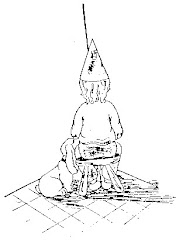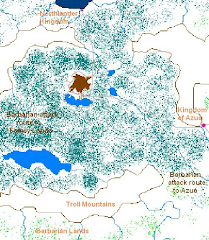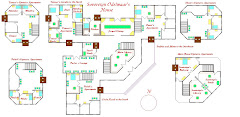The Free People were races of intelligent beings created by the High King. By the time of Flames of Hatred (FOH) only three of the original races remained, plus one which came later. When the Children of Fire (COF) fought and nearly destroyed the Sea the High King declared the Sea would be taken from the COF and given to the Free People. Originally, there were five.
Nomads:
Nomads were the tallest, ranging in height from six to eight feet. They were also the only race to not build permanent villages. They lived on the grasslands, near forested regions, but out under the sun where they watched over Kensington's marvelous herds of winged horses. They lived in small family groups of fifty or more, but usually never more than one hundred. Should a group grow too large in size it would split. Mostly, they were hunters. However, they did trade at whiles with humans who lived near the forrests' edges. This race was virtually wiped out during the Great War which nearly destroyed the Sea. It is purported to have died out entirely when Massimo, last of the Nomads, died. Nomads typically lived around six score years.
Pennans:
Pennans were also tall, but not so much as the Nomads. They were also the only race which had been granted the skies: Pennans had wings. They were a shy people, living in the mountain high places. The Byth and Wyth dragons, which shared the mountains with the Pennans, taught them much. They were amazing not only because they flew, but by reason of their imperviousness to the cold. Even in freezing weather Pennans only wore light garments. But they did trade at whiles with humans and dwarfs, using knowledge taken from the great dragons to produce crafts and jewelry coveted by other races. During the Great War the dragons foughtfor the Pennans' protection. But the effort only seemed to draw focus and ultimately the Pennans went the way of the Nomads. Elva is said to have been the last. Like Nomads, Pennans lived roughly six score years.
Humans:
Humans were the most populous race, multiplying much faster than the other four. Thus, human settlements could recover much quicker than those of dwarfs or figgits. It also helped them survive the Great War, which devastated the other races. Humans took immediate advantage of the Windows created by the COF to help the Free People disburse after the breaking up of the First World. So it is that humans can be found on nearly every world. They engaged in all manner of means to survive, from hunting to fishing to farming. They were incredibly adaptable - and wayward. Humans proved to be the easiest race for Zenephone to pervert to his will. Perhaps this was due to the human need to always know more. Coveteousness was probably their greatest weakness. Human lifespans were greatly determined by the world in which they lived and so there was a great span of projected years, ranging from as low as three score to as high as seven or even eight. They also had a wide variation in height - even within a world - from five to seven feet.
Dwarfs:
Dwarfs were a rugged and stocky people, averaging around five feet tall. Although not shy, they were secretive and protective of themselves and what they considered to be theirs. They were a hairy people, all growing long, thick beards which they trimmed to personal fashion. They were loyal to their friends and unforgiving to their enemies, but even amongst friends they would anger quickly. They were noted for four things: fishing, farming, mining and war. Dwarfs had no problem involving themselves in wars which had nothing to do with them. Sometimes, if the prize was great enough, they would fight all sides. Although short in stature, even Nomads and Pennans tended to hesitate before attacking a Dwarf army. Like dragons, Dwarfs tended to be lured to worlds containing large quantities of precious gemstones.
Figgits:
Figgits were the smallest people, never passing five feet in height. They were mostly a farming people, but what they are most renown for is their navigation of the Great Sea. Of all the races only the Figgits truly heeded the council of the COF and learned the ways of the Sea, making maps to help them navigate. The Figgits were also the only race not to intermingle with the mortal followers of Zenephone (called Overlords). In the Years of Disbursion the Figgits did not use Windows to move from world to world. They sailed the dangerous waters into the Cloud, learning to trust the natural currents the ocean provided. In later years, after the Windows had been shut down, Figgits became the conveyers of people from one world to another.
Thursday, October 30, 2008
The Children of Fire
The Children of Fire are described in the prologue to Flames of Hatred (FOH) as the "offspring of the High King's thought". While poetic, this is not wholly descriptive.
The Children of Fire are beings of Fire, Fire being more than a simple chemical reaction. Fire in this sense means "living power". They are not physical beings, bound by physical laws, although they can take physical form, in which case they then become subject to some of the physical laws (they can be killed, for instance). When in their natural state they appear as bright light, although not 'white' light. Each has their own color, and the stronger they are the more brightly they shine. It is in this state they are at their peak of power.
When dealing with the mortal beings and creatures of the Great Sea the Children of Fire generally take on physical form. This can be literally anything they choose. They can remove these forms like garments. However, doing so requires a great amount of energy, and they become vulnerable immediately after doing so. Thus, form changing is generally not done in the presence of enemies.
The Children of Fire were the laborers in the Great Sea's 'detailing'. The Sea itself was made solely by the High King. However, there was little to it at that time. Much of the fashioning which took place afterward was done by the Children of Fire - at the direction of the High King. (Frank Lloyd Wright is said to have built all of his magnificent structures, but I doubt very much that he cut every timber and stone and fitted them together. He may have done some of the physical labor, but mostly he maintained the design and kept the workmen focused on his goal. So it was with the High King and the Great Sea.)
Part of the Children's work was the creation of certain creatures. These creatures were independent of thought and will, able to converse with intelligence, but they were not able to reproduce. Only the dragons, and that with limitations. The creatures were mortal in the sense they would die if they did not eat, or caught a severe sickness, or were given a mortal blow. But age did not diminish their strength. They were highly resistant to illness, so only a few died in that manner. Some did starve during hard times, but most which died did so because of war.
The Children of Fire were given the Great Sea as a playground, and such they did during the years of construction. One was made head over all. This was Kensington, who was the first to come. Draem supported him wholly, but Zenophone was jealous and coveted control. These were the first three to come to the Great Sea, and they led the construction.
The Children of Fire are beings of Fire, Fire being more than a simple chemical reaction. Fire in this sense means "living power". They are not physical beings, bound by physical laws, although they can take physical form, in which case they then become subject to some of the physical laws (they can be killed, for instance). When in their natural state they appear as bright light, although not 'white' light. Each has their own color, and the stronger they are the more brightly they shine. It is in this state they are at their peak of power.
When dealing with the mortal beings and creatures of the Great Sea the Children of Fire generally take on physical form. This can be literally anything they choose. They can remove these forms like garments. However, doing so requires a great amount of energy, and they become vulnerable immediately after doing so. Thus, form changing is generally not done in the presence of enemies.
The Children of Fire were the laborers in the Great Sea's 'detailing'. The Sea itself was made solely by the High King. However, there was little to it at that time. Much of the fashioning which took place afterward was done by the Children of Fire - at the direction of the High King. (Frank Lloyd Wright is said to have built all of his magnificent structures, but I doubt very much that he cut every timber and stone and fitted them together. He may have done some of the physical labor, but mostly he maintained the design and kept the workmen focused on his goal. So it was with the High King and the Great Sea.)
Part of the Children's work was the creation of certain creatures. These creatures were independent of thought and will, able to converse with intelligence, but they were not able to reproduce. Only the dragons, and that with limitations. The creatures were mortal in the sense they would die if they did not eat, or caught a severe sickness, or were given a mortal blow. But age did not diminish their strength. They were highly resistant to illness, so only a few died in that manner. Some did starve during hard times, but most which died did so because of war.
The Children of Fire were given the Great Sea as a playground, and such they did during the years of construction. One was made head over all. This was Kensington, who was the first to come. Draem supported him wholly, but Zenophone was jealous and coveted control. These were the first three to come to the Great Sea, and they led the construction.
Wednesday, October 29, 2008
The High King
The High King is the Great Sea's Creator. It is generally accepted to reference the High King as male, but in actuality the High King is a spirit, and so without gender.
The High King does not enter directly into any of the existing novels, although reference is made to him in a variety of ways. As of this posting, I can think of only one instance in which the High King speaks directly to anyone, and that is in a book which has yet to be written, so it may not even happen.
Although vocally absent, the sense remains that the High King is still very interested in what transpires in and on the Great Sea. Certainly he has the power to intervene however he wishes. It is to be assumed that he does, but that his methods of intervention are so intertwined with the natural course of events on the Great Sea it is difficult, if not impossible, to know when something took place by reason of intervention or simply as a matter of course.
This 'detachment', as it were, is necessary to the presentation of Swords of Fire. The characters who struggle through their lives must be seen to resolve their conflicts through natural means. No 'miracles' will aid them. (At least, none which are not of their own devising.) But as stated earlier, the High King is very interested in what transpires in and on the Great Sea.
The High King does not enter directly into any of the existing novels, although reference is made to him in a variety of ways. As of this posting, I can think of only one instance in which the High King speaks directly to anyone, and that is in a book which has yet to be written, so it may not even happen.
Although vocally absent, the sense remains that the High King is still very interested in what transpires in and on the Great Sea. Certainly he has the power to intervene however he wishes. It is to be assumed that he does, but that his methods of intervention are so intertwined with the natural course of events on the Great Sea it is difficult, if not impossible, to know when something took place by reason of intervention or simply as a matter of course.
This 'detachment', as it were, is necessary to the presentation of Swords of Fire. The characters who struggle through their lives must be seen to resolve their conflicts through natural means. No 'miracles' will aid them. (At least, none which are not of their own devising.) But as stated earlier, the High King is very interested in what transpires in and on the Great Sea.
Subscribe to:
Comments (Atom)
Today's Music
Yeah. That's The Great Sea all right.






